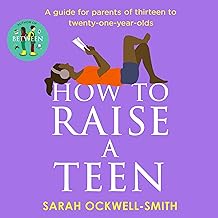'Disrespect and laziness' teen expert reveals the five most common teenage problems and solutions (#3 might surprise you)
GoodToKnow expert panellist Sarah Ockwell-Smith reveals the main reasons why teenagers are how they are


Do you remember the days when you felt stressed about toddler tantrums? When they'd stomp their foot and throw their lunch on the floor because you served it on the wrong colour plate? Well, teen expert and author Sarah Ockwell-Smith shares insight into common teenage problems parents encounter, so buckle up...
Now that infuriating but cherubic toddler may be taller than you and no longer placated with CBeebies, stickers or a packet of chocolate buttons. At some point, all parents of teens have a shared thought: "Why did I ever think the toddler years were hard?” Your strapping teen is not too different from the cute little toddler they once were, at least from a brain development perspective. Many parents wonder if their teen is listening to them and why they have 'annoying' habits. Maybe it's because teenagers need more sleep.
The human brain is not fully developed until the late twenties (years, not months!). Throughout childhood and adolescence, the brain is busy connecting, insulating the wiring and pruning out any excess connections. This work does not happen uniformly throughout the brain. However, areas that are needed for maintaining homeostasis - a state of balance - in the body are completed first, and the last area to mature, namely contained in the prefrontal cortex, are those which are responsible for higher thought processes, like logic and reason, emotion and impulse regulation.
As the saying goes, “little kids, little problems, big kids, big problems.” Toddler tantrums are no match for the incandescent rage, rudeness, defiance, and sulking of the teenage years, not to mention the silence in between. Parenting conundrums can sometimes feel insurmountable during adolescence. Still, at their heart, all issues parents of teens struggle with are underpinned by the same neurological processes that directed the behaviour we found so tricky in toddlerhood. The good news is that you survived toddlerhood and can survive the teen years, too.
Let’s take a look at some of the most common tricky behaviours parents of teens struggle with and some practical ways parents can handle them:
Five most common teenage problems and solutions
- Laziness & messiness
- Refusing to get out of bed
- Homework refusal
- Emotional volatility
- Rudeness and disrespect
1. Laziness & messiness
Messy bedrooms, wet towels left on the bathroom floor and a collection of dirty mugs, plates, glasses and cutlery make you feel like you’ve had a day trip to Ikea when you leave their bedroom. So often, teens are called lazy, but there are good reasons behind their behaviour, I promise. It doesn't make it less irritating, but it can make it a little easier to bear, knowing that there's more at play than your teenager 'just trying to wind you up'.
Reason for this: Messiness may feel like a deliberate attempt to wind you up or make you feel taken for granted, but in reality, the culprits are more likely your teen’s lack of hypothetical thinking or forethought combined with poor organisational skills. They don’t create mess deliberately; it just happens because they struggle to understand the consequences of living in squalor, and even if they did, they struggle to organise it.
Parenting advice, hot topics, best buys and family finance tips delivered straight to your inbox.
What you can do: While you can’t change your teen’s brain, you can help them to break down tidying into smaller, more achievable chunks, for instance, having a rule that they need to bring down dirty crockery and glassware every morning, rather than just telling them to tidy their room. So long as their room is mostly hygienic, perhaps the next best step you can take here is to close the door and leave them to it.
2. Refusing to get out of bed in the morning
The early years of parenting are exhausting for so many reasons, but the pre-dawn morning wakes, no matter how much blackout fabric you cover the bedroom in, are surely one of the top causes of said exhaustion. The teen years finally grant your wish for your child to sleep later in the morning, only now you have a new problem. Trying to wake them is like trying to raise the dead; mornings quickly give way to afternoons, and you wonder when they will ever get out of bed.
Reason for this: Once again, many presume teens are being lazy when they want to sleep the day away, but they’re wrong. Teenagers have a different chronotype (body clock) to both younger children and adults. They are biologically programmed to go to bed later at night and wake later in the morning. This effect starts to wear off in the early twenties.
What you can do: There’s not a huge amount parents can do here except to know that there is a reason why their teen is so impossible to wake up. Encourage good sleep hygiene (e.g. no phones in the bedroom) and getting an old-fashioned alarm clock that is impossible to sleep through are the best solutions.
3. Procrastination and homework refusal
“I’ll do it later.” If ever there were four words most oft uttered by teens, it’s surely a variation of these. Teens are not known for their prompt task completion and will do anything to avoid getting started on something that they don’t particularly want to do (especially homework and chores).
Reason for this: Once again, this isn’t laziness, but another impact of their wonderful changing brains. Executive functions, the name for a group of mental skills including organisation, self-regulation and task-initiation, are still developing during adolescence, and until they mature, teens struggle to get going on tasks, especially if they are not inherently motivated to complete them.
What you can do: Interestingly, during adolescence, the area of the brain responsible for rewards – the ventral striatum – is highly sensitive, meaning that teens are more motivated by rewards than younger children or adults. What does this mean? It means that adding a little dangled carrot to any encouragement and instructions we give a teen with a task to complete can spur them on to get going. Something like “How about you do an hour’s homework now, then go on your PC/Xbox afterwards?”, or “Once you’ve finished putting your clothes away I’ll make us a coffee and a piece of cake”. Add to this some clear, easy-to-follow instructions that take away the stress of not knowing where and how to start, and you can ease the procrastination somewhat.
4. Emotional volatility
If ever you overhear a conversation between parents of teens, you might recognise these statements, “Teen boys are full of testosterone; it makes them angry!” or “Teenage girls are swimming in oestrogen. It makes them stroppy!”. The thing is, they’re both wrong. Our society blames so much difficult behaviour on teenage hormones, but there is little evidence to support this idea. In fact, we know that testosterone is linked to increased risk-taking behaviour in adolescence, but beyond this, there is little correlation between hormone levels and behaviour. What causes their intense emotions, then? Once again, it’s their brains.
Reason for this: The last area of the brain that matures is responsible for keeping a lid on emotions. It’s the seat of impulse control and emotion regulation and the area that helps them to take a breath and calm down before shouting, screaming or sobbing uncontrollably when something is lost or doesn’t pan out how they’d hoped. In essence, teen erupting emotions are the same as toddler tantrums. Both are normal, and neither is a sign of bad parenting or problematic personalities.
What you can do: As difficult as it may be, teens need their parents to be their emotional rocks. When they’re in the midst of emotional chaos, they need us to be calm and collected. When you next feel the red mist rising and find yourself about to yell at your teen, remind yourself, “they can’t help this. I need to be the adult and stay calm” Take a breath or take a few minutes in another room if you need to, and say “I can see you’re having a tough time, how can I help?”
5. Self-centeredness and disrespect
At times, it may feel as if your teen is self-absorbed and selfish. This is often married with blatantly disrespectful behaviour and no consideration for your feelings. As parents, we naturally take these words and behaviours personally, but we shouldn’t. Adolescence is a period of self-discovery and identity development; in essence, it is a time when teens need to focus on themselves and focus less on the thoughts and feelings of others. This doesn’t make them selfish, it just means that they need to look inwards a little more than they need to look outwards.
Reason for this: While they may say things that can be hurtful, or deemed disrespectful, these words (and sometimes actions) really are usually nothing more than an illustration of their immature brains and the transition they are going through.
What you can do: Don’t take things personally. If your teen says something hurtful, look beyond the words. In the heat of the moment, they will say things that they don’t mean. Instead, try to focus on the emotions underlying them and keep reminding yourself that they are not saying things to disrespect you deliberately. Ultimately, you can’t demand respect from your teen, but you can earn it. How? Treating them with respect first also includes modelling graciousness when they’re going through a tough time.
Maybe one or two of these points surprised you, many certainly go against common parenting teens advice. The great thing about raising teens though, is that we already have a wealth of expertise, even if we feel like novice parents all over again. We’ve all been a teen and we all know how it felt to be misunderstood by the adults in our life. You can utilise that knowledge to guide you with your own teen, especially if you find yourself in a situation where you feel flummoxed as a parent. The simplest way to decide on a course of action is to call up your own memories and let them guide you. The next time your teen does something you struggle with, ask yourself what you needed from your parents when you were their age and acted in a similar way. You’ll have your answer.
Your teen might be going on social media too much but a new study has found that it's also giving them these seven life skills. We also speak to the experts on what 'teen-ternity' leave is all about and why it's becoming a popular choice for parents with young adults, and also what to expect when your teenager starts dating.

Sarah Ockwell-Smith is a mother of four young adults. She has a background in Psychology and clinical research and has also worked as an antenatal teacher and doula. Sarah has written fifteen childcare books, covering everything from newborns to teenagers, with a special emphasis on ‘gentle parenting’. Sarah regularly contributes to National TV and radio, including Good Morning Britain and BBC Radio 4 and 5, she has also written for national publications including The Guardian, The Express, The Daily Mail, The IPaper and The HuffPost. Sarah lives with her family, two rescue dogs, cats and chickens in North Essex. Sarah's newest book How to raise a teen is due to hit shelves July 4th 2024.
